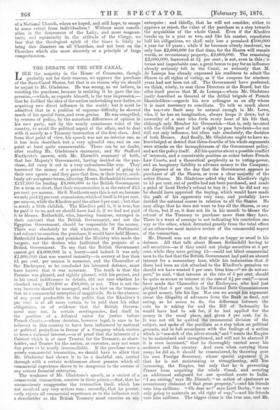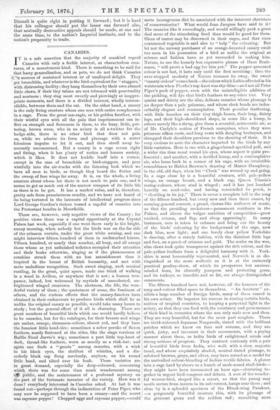THE DEBATE ON THE SUEZ CANAL.
T4IKE the majority in the House of Commons, though probably not for their reasons, we approve the purchase of the Suez-Canal Shares, but that is no reason why we should be unjust to Mr. Gladstone. He was wrong, as we believe, in resisting the purchase, because in resisting it he gave the im- pression,—which, as regards himself, is the true impression,— that he disliked the idea of the nation undertaking new duties, or acquiring new direct influence in the world ; but it must be admitted that in a position of supreme difficulty he showed much of his special force, and even genius. He was compelled, by reasons of policy, by the notorious differences of opinion in his own party, and by the nearly unanimous voice of the country, to avoid the political aspect of the affair, and to deal with it merely as a Treasury transaction of the first class. And from that point of view, his speech was not an inferior one, as it has been described, but a very splendid one, and on one point at least quite unanswerable. There can be no doubt, after reading Mr. Gladstone's statement, and Sir Stafford Northcote's answer, with Mr. Disraeli's summary of both, that her Majesty's Government, having decided on the pur- 'ahem, did carry it out in a very unbusiness-like way. They borrowed the money of a private firm, instead of going to their own agents ; and they gave that firm, in their hurry, need-. lessly advantageous terms, allowing Messrs. Rothschild to receive £137,000 for lending £4,000,000 to the British Government for a term so short, that their remuneration is at the rate of £15 per cent. per annum. Sir S. Northcote says this is not so, because we only paid 2.k per cent. commission, which of itself is 10 per cent. per annum, while the Khedive paid the other 5 per cent. ; but that is surely a little childish. The Khedive paid it, it is true, but he paid it to us, and we should have had it, if we had not paid it to Messrs. Rothschild, who, knowing business, arranged in their contract that the British Government, and not the Egyptian Government, should be responsible for the money. There was absolutely no risk whatever, for if Parliament had refused to sanction the purchase, it would have held Messrs. Rothschild harmless, and punished the Ministry who made the bargain, not the dealers who facilitated the projects of a British Government. To say that the British Government cannot get £4,000,000 in a hurry—and indeed, it was only £,000,000 that was wanted instantly—in secrecy at less than 1$ per cent. per annum is nonsense, and the Chancellor of the Exchequer, as he concluded his laboured defence, must have known that it was nonsense. The truth is that the Premier was pleased, and rightly pleased, with his project, and in his usual indifference to details, did not care whether he chucked away £70,000 or £80,000, or not. That is not the way business should be managed, and is a blot on the transac- tion as a commercial enterprise of magnitude. So is the absence of any proof producible to the public that the Khedive's 5 per cent. is at all more certain to be paid than his other obligations, or of evidence that the British Govern- ment may not, in certain contingencies, find itself in the position of a defeated suitor for justice before French Courts,—whose decision, however legal, is sure to be believed in this country to have been influenced by national or political prejudices in favour of a Company which excites so keen a national interest,—or of proof that the interests of a Cabinet which is at once Trustee for the Treasury, as share- holder, and Trustee for the nation, as customer, may not some day prove to be nearly irreconcilable. If the purchase were a purely commercial transaction, we should have to allow that Mr. Gladstone had shown it to be a doubtful one, carried through with a certain recklessness about pennies which all commercial experience shows to be dangerous to the success of any serious financial enterprise. The weakness of Mr. Gladstone's speech, as a review of a commercial transaction, consists in three points,—first, that he unconsciously exaggerates the transaction itself, which has not involved any very serious sum ; secondly, that he persist- ently rejects all commercial experience as to the influence such a shareholder as the British Treasury must exercise on any enterprise ; and thirdly, that he will not consider, either to approve or reject, the value of the purchase as a step towards the acquisition of the whole Canal. Even if the Khedive breaks up in a year or two, and like his master, repudiates half his obligations, we shall only lose a promised £100,000 a year for 19 years ; while if he becomes utterly insolvent, we only lose £2,000,000 for that time, for the Shares will remain worth, as reversionary property, £2,000,000. The remaining £2,000,000, borrowed at 31, per cent., is not, even in thisrs- treme and improbable case, a great bonus to pay for an influence already seriously felt in the Canal, so seriously that M. de Lesseps has already expressed his readiness to admit the Shares to all rights of voting, as if the coupons for nineteen years had not been cut off. The Government have preferred, we think, wisely, to seat three Directors at the Board, but the offer itself proves that M. de Lesseps—whom Mr. Gladstone justly described as General of the drilled brigade of French Shareholders—regards his new colleague as an ally whom it is most necessary to conciliate. To talk so much about the ten-vote limit may be natural enough in Mr. Lowe, who, if he has an imagination, always keeps it down, but is unworthy of a man who feels every hour of his life that, although only Member for Greenwich—that is, only invested with the 656th part of half a right to pass bye-laws—he can still not only influence, but often rule absolutely, the decision of both Houses. And finally, Mr. Gladstone ought to have ac- knowledged or denied that three-fourths of his whole arguments were attacks on the incompleteness of the Government policy, and not the policy itself. All his queries about a possible conflict of interests, and a conceivable position as suitor before French Law Courts, and a theoretical perplexity as to voting-power, and an imaginary liability to advance money to the Company, are disposed of on the day that the Government appears as purchaser of all the Shares, or even a clear majority of the active Shares. Mr. Gladstone asked why the Khedive's right to 15 per cent. out of profits had not been purchased, and made a point of Lord Derby's refusal to buy it ; but he did not say he should have approved the buying, which would have made the path of his opponents very easy, and probably have decided the national course in relation to all the Shares. He may allege that he does not want to buy all the Shares, or any of them, but if so, it does not lie in his mouth to blame the refusal of the Treasury to purchase more than they have. There is a want of courage in not indicating his conviction one way or the other, which detracted greatly from the total effect of an otherwise most incisive review of the commercial aspect of the transaction.
Mr. Disraeli was not at first quite so happy as usual in his defence. AU that talk about Messrs. Rothschild having to sell securities—as if they could not pledge securities at 4 per cent. while they were getting 15—could not blind commercial men to the fact that the British Government had paid an absurd interest for a momentary loan, while his insinuation that if there had been no risk attached to the Khedive's promises we should not have wanted 5 per cent. from him—" we do not ex- pect," he said, "that interest at the rate of 5 per cent. should be quite as secure as interest at the rate of 3+ per cent!'—must have made the Chancellor of the Exchequer, who had just pledged that 5 per cent. to the National Debt Commissioners as good money, bite his lips. Nor can we accept his argument about the illegality of advances from the Bank as final, not seeing, as he seems to do, the difference between the vote he is asking for and the Bill of Indemnity he would have had to ask for, if he had applied for the money in the usual place, and given 4 per cent. for it. It was not till he quitted the commercial division of the subject, and spoke of the purchase as a step taken on political grounds, and in full accordance with the feelings of a nation which is " sea-sick of the silver streak," and " wants the Empire to be maintained and strengthened, and will not be alarmed if it is even increased," that he thoroughly carried away his audience and the country. And even when carrying them away, he did so, it should be remembered, by throwing over his own Foreign Secretary, whose special argumentt.is that he is not maintaining or strengthening, still Iess increasing, the Empire, but only that he is preventing France from acquiring the whole Canal, and securing an additional safeguard for our speediest route to India. " I am raising," says Mr. Disraeli, " an action of ejectment as reversionary claimant of that great property,"—and his friends vote him millions. " Oh dear no !" says Lord Derby, " we are only going to maintain an old right of way,"—and his friends vote him millions. The bigger claim is the true one, and Mr.
Disraeli is quite right in putting it forward ; but it is hard that his colleague should put the lesser one forward also, that mutually destructive appeals should be made, at one and the same time, to the nation's Imperial instincts, and to the nation's propensity to trade.



































 Previous page
Previous page